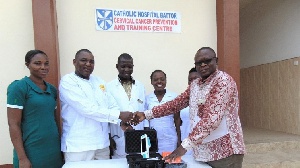Phoenix Resource Center Global Aid Ghana (PRCGA), a Non-governmental, Non-profit Organization has donated medical equipment to the Cervical Cancer Prevention and Training Center at the Battor Catholic Hospital in North Tongu District of the Volta Region.
The equipment, an Enhanced Visual Assessment (EVA) system, is an ultra-modern mobile colposcopy device used in screening for cervical cancer. Barely one year ago on June 29th 2017, PRCGA made a similar donation of cervical cancer screening equipment to the same hospital in support of the facility’s efforts at expanding access to the screening and treatment for cervical cancer in the Volta Region and beyond.
Speaking to Staff and Management of the hospital at a brief presentation ceremony, the Executive Director of PRCGA Dr. Koku Awoonor said the pioneering role of the Catholic Hospital, Battor in expanding access to cervical cancer screening and treatment in Ghana is an inspiration hence the decision by PRCGA to assist the Center for the second time. It is also in recognition of the good work the Centre is doing amidst limited resources and serving women in the region and beyond.
“Since I came to know about your work I have been following the great things you do and personally, l want to commend you for your commitment and hard work”. He continued “You started this not long ago but you are already doing a lot with little resources that is why it is important to recognize and support your efforts so that you can reach out to many places to save lives with this basic equipment”.
Dr. Awoonor said the donation by PRCGA forms part of the organization’s core objective of mobilizing much needed medical resources to provide support to health facilities that are rendering critical services in deprived and hard-to-reach settings.
Speaking in an interview later, he further disclosed that despite the startling statistics of cervical cancer related deaths, Ghana was yet to make the screening and treatment of this preventable disease accessible in our health institutions throughout the country.
Similarly, the Human Papilloma Virus (the virus causing cervical cancer) vaccine is not inclusive in Ghana’s Expanded Program on Immunization (EPI) through which all children are routinely vaccinated to protect them against several vaccine preventable diseases. Dr. Awoonor noted that it is against this background that the work of institutions like the Catholic Hospital, Battor in Ghana deserves commendation and support.
Dr. Bernard Hayford Atuguba, the Medical Superintendent of the Battor Catholic Hospital who received the equipment on behalf of the Staff and Management thanked PRCGA for the wonderful support and said they were motivated by the donation. He expressed hope that the additional equipment will help them to reach and serve many more women who they may not have been able to reach.
Dr. Atuguba said the hospital was doing its best not only to provide the screening, treatment and vaccination but also supporting capacity building for hospitals in various parts of the country who wish to set up the service in their facilities. He appealed to leadership of public hospitals to show interest in cervical cancer prevention by sponsoring their staff for the training so as to take the service everywhere in Ghana and prevent death of women from the disease.
Head of the Cervical Cancer Prevention and Training Center Dr. Kofi Effah added his words of appreciation to Dr. Awoonor and PRCGA for the donation and said the Center was resolute in their objective of setting the pace in cervical cancer prevention and training in Ghana.
He pointed out that the Centre which is currently been managed by only three staff and limited equipment needs a lot of logistics to be able to carry out outreach services and also follow up to monitor the performance of the health professionals who have been trained and are currently providing the services in other parts of the country.
“The challenges are a lot but we will continue to work hard. Currently the Center does not have a vehicle and when we need to go on outreach we have to go and rent one”.
This situation he said is affecting their potentials.
Dr. Effah said the Government of Ghana could potentially scale up cervical cancer screening and treatment and make the service available in every community by taking advantage of the country’s primary health care model, the Community-based Health Planning and Service (CHPS) system. He revealed that “Ghana can eventually eradicate the disease in the next 20 years or so if the country could consider vaccinating all children-both boys and girls-within the ages of 9-14 years”.
According to Dr. Effah current estimates indicate that in Ghana every year 3,052 women are diagnosed with cervical cancer and 1,556 die from the disease. The World Health Organization (WHO) projects that by the year 2025, 5,000 new cases of cervical cancer and 3,361 cervical cancer deaths will occur annually in Ghana.
These deaths he noted could be averted if the country could adopt a national policy for cervical cancer screening as done in many countries. “Countries that have organized screening programs have successfully reduced the incidence of cervical cancer by picking up precancerous lesions of the cervix and treating them before they develop into cancer”, he observed.
The Catholic Hospital, Battor has been involved in cervical cancer screening for more than twenty years suggestive the establishment of the Cervical Cancer Prevention and Training Center at the facility in 2017 is a culmination of years of commitment, hard work and rich experience.
The Center currently runs two modular training courses (two weeks per a module) for both private and public institutions and at same time providing daily services in cervical cancer screening, treatment and vaccination to the general public.
Some of the categories of health staff that have received training at the Center include Community Health Nurses, General Nurses, Doctors, Physician Assistants and Midwives etc.
In 2017 alone, the Center screened a total of 1,438 women. Before the Centre was opened the Hospital had been carrying out outreaches to various parts of the country usually with the support of individuals and institutions through which several thousands of women have been screened.
Dr. Effah assured PRCGA and all who would like to donate to the Center that their donations will go along to assist the Center subsidize the cost of its services making the services affordable and also making it easy for them to continue to run outreaches.
Health News of Tuesday, 3 April 2018
Source: www.newsghana.com.gh

















